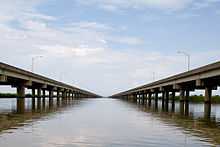Jubilee Parkway
| Jubilee Parkway | |
|---|---|
 An eastern portion of the Jubilee Parkway as seen from Meaher State Park. | |
| Carries |
4 lanes of |
| Crosses | Mobile Bay |
| Locale | Baldwin County / Mobile, Alabama, USA |
| Design | Girder bridge |
| Total length | 7.5 miles (12.1 km) |
| Opened | 1978 |
The Jubilee Parkway is a pair of parallel concrete viaduct bridges that carry Interstate 10 across Mobile Bay from the George Wallace Tunnel on Blakeley Island in Mobile, Alabama eastbound to Spanish Fort/Daphne, Alabama. The bridges are similar in design to the pre-Hurricane Katrina I-10 Twin Span Bridge near New Orleans, Louisiana. Each of the two bridges is two lanes wide, for a total of four lanes, and 7.5 miles (12.1 km) long. The parkway was completed in 1978[1] and crosses the northern portion of Mobile Bay, running roughly parallel to the nearby Battleship Parkway.[2] It was named for the jubilee phenomena that occurs intermittently in Mobile Bay, but is commonly referred to locally and in the media as the "Bayway".[3]
Expansion

Since 2001, the Alabama Department of Transportation (ALDOT) has planned to expand the parkway to a total of eight lanes in addition to a connecting cable-stayed bridge with a main span 1,250 feet (381 m) long and 190 feet (58 m) high that would bypass the George Wallace Tunnel. This is intended to eliminate the current traffic bottleneck on I-10 at the tunnel,[2] but is very controversial locally due to the proposed bridge's potential visual and economic impact on the city. The arguments against the bridge have focused on the bridge's height of roughly 500 feet (152 m), taller than any other structure in the city except for the RSA Battle House Tower, as potentially overshadowing the city. The potential economic impact is that, with less than 190 feet (58 m) of clearance under the bridge, it would hamper large ships and projects from the Port of Mobile and prevent large cruise ships from accessing the newly built Alabama Cruise Terminal.[4]
Incidents
On the morning of 20 March 1995 the parkway was the scene of one of the largest multi-vehicle collisions in United States history. The accident involved around 200 vehicles and resulted in more than 90 injuries and 1 death. The causative agent was determined to be fog from Mobile Bay.[5]
During the January 28-30, 2014 Ice Storm that impacted the southeast, the Bayway was closed several times for hours while ALDOT crews used road grading equipment to remove ice buildup from the roadway. Traffic was diverted onto the Causeway during the shutdown. When questioned why the Bayway wasn't sanded or salted, ALDOT commented that they did not have the spreader equipment since ice storms occur every twenty years or so along the coast. [6]
References
| Wikimedia Commons has media related to Jubilee Parkway. |
- ↑ "History". "Rivers of Alabama: Mobile Bay". Retrieved 2007-12-28.
- ↑ 2.0 2.1 "Mobile". "Mobile @ SouthEastRoads". Retrieved 2007-12-28.
- ↑ "Interstate 10 Eastbound". "Alabama: SouthEastRoads". Retrieved 2007-12-28.
- ↑ "Bridging the divide or the snarl ahead?". "Mobile Bay Times". Retrieved 2007-12-28.
- ↑ "Performance of Satellite Fog Detection Techniques". "National Weather Association". Retrieved 2007-12-28.
- ↑ "WKRG".
Coordinates: 30°39′55″N 87°57′49″W / 30.6652°N 87.9637°W